Words Beyond Walls: Writing to ICE Detainees at Wyatt
Michael Nagle "would love to attend a protest, but he doesn’t have the energy to stand for hours at a time. Instead, he writes to detainees."
The “No Kings” protests across the state weren’t the only activism in Rhode Island on Saturday, June 14th. There was also a smaller, quieter gathering at a bookstore in Providence.
“Words Beyond Walls: Writing to ICE Detainees at Wyatt” at Riffraff Bookstore & Bar was organized by writer and activist Michael Nagle, who moved to Rhode Island from California earlier this year. The focus of the event – the quasi-public Wyatt Detention Facility in Central Falls – is one of just a handful of ICE-affiliated detention facilities in New England. According to the latest public data, there are more than 100 ICE detainees being held there.
The Wyatt is a frequent gathering place for activists and loved ones of detainees who want to call attention to the facility. A recent AMOR report on conditions inside described insufficient meals, “exorbitant” costs for phone calls and supplemental food, medical neglect, and discriminatory treatment.
In his introductory remarks at Saturday’s event, Nagle, who is a cancer patient, said that he has been thinking a lot about the different kinds of activism this moment needs. He would love to attend a protest, but he doesn’t have the energy to stand for hours at a time. Instead, he writes to detainees.
Nagle walked attendees through the process of getting set up an account with GettingOut, the online messaging platform used by the Wyatt. You can view his Google Doc with instructions, suggested conversation topics, and other resources here. A sample message to a detainee from the document reads, in part, “I am writing because I want you to know you are not being forgotten in our community.”
Nagle also shared a few disclaimers about this kind of activism. The GettingOut platform – available as both a website and a mobile app – is a bit clunky and can sometimes require some fiddling. It also isn’t free: users need to make a minimum initial deposit of $10, and each message costs $0.25. (He said that, as far as he can tell, Wyatt detainees aren’t charged to text back.) Getting set up in the system also requires sharing your name and credit card information, and he noted that communications with Wyatt detainees are almost certainly monitored.
But for folks who aren’t deterred by those hurdles, writing with detainees can be rewarding. “Something in me calms when I imagine the fantasy of everyone there [at Wyatt] having a digital witness,” Nagle told RI Future. “I have some fear that institutions really get dark when they stop getting witnessed.”
Below is a transcript of Nagle’s opening remarks from the event, as well as a Q&A that RI Future conducted with him at the bookstore. Both have been edited and condensed for clarity.
OPENING REMARKS FROM MICHAEL NAGLE:
The way I got interested in this was, about a month or two ago, a friend of mine who had spent time forcibly in juvie was like, “Hey, let’s figure out how to write to people in the ICE centers.” And I thought, “Huh. That’s an interesting idea. I never considered that.”
Different centers have different levels of ease. It turns out Wyatt, once you get set up, is pretty easy to communicate with. There’s this platform called GettingOut. I got registered.
I didn’t know where to start. I just searched for my name, “Michael,” and started writing to all the Michaels at Wyatt, just to have a starting point where to talk to people.
And for me, I was testing out, does this platform work? Is it real? Is this just a mirage? It turns out once you get set up, it works, and people are really happy and eager to hear from you.
It’s a mix of English and Spanish speakers. People are in there for all kinds of reasons. Typically, they are waiting for their sentencing. So they’re in a kind of Twilight Zone.
One person’s comment really stuck with me. He described it as being like Groundhog Day in there. There’s so little contact with the outside world [that] getting messages felt really grounding, even if we’re [just] talking about TV or the Bible. He said, otherwise, there’s really very little awareness of time passing [or] what’s happening on the outside.
One of the things that’s a bit heartbreaking about this sort of platform is, as you search, it’ll show you everyone with that name, and you can see that [the numbers have] exploded in the past few weeks. For me, what that’s opened up is this is a different kind of activist work than [just knowing] the raw facts. It’s reaching out to people. It’s starting to learn, what’s it like for people in here? What did they expect, maybe when they came to the States? Or what were they imagining? What has happened to them? Often, there’s a sense of being confused or betrayed.
Faith and hope will come up quite a lot, I think, because how else do you get through an experience that’s going and going?
I would say about half the people I wrote [to] wrote me back. Half maybe never got the message or don’t check the tablets [that detainees have access to]. But half do. And at this point, if I don’t write in a couple days, they write me, and it makes the back and forth very smooth and very easy.
People have different philosophies of what’s a first message. I have been taking a stance of, “Let’s just check baseline safety.” Like, does someone know you’re in there? If something really gross, inhumane happens, do you have a thought I can tell someone that they’re going to care about it? Most folks have loved ones [on the outside], but not everyone.
I check if folks have legal representation. AMOR has been doing a fantastic job and… there’s also Boston Immigration Justice Accompaniment Network.
Other people…want to keep things lighter. And I think there’s also a logic to that. It’s so heavy in there, maybe a light message about what it’s like outside, and recent events are also welcome. The more I message, the more I think really any message is solid. If somebody knows, “There is a person who, within a week, is going to get back to me if I’m feeling stressed, something weird happens, if I’m bored,” that gives them some support.
Someone has asked me the question, “Were there a crisis that’s been reported to you, what would you do?” I would go to those organizations [AMOR and Boston Immigration Justice Accompaniment Network].
I try to establish myself as a peer, mutual, friendly person in Providence [who is] concerned. That’s it. I wouldn’t know what to do officially. But I can make a call to AMOR. [I’m] happy to take that kind of responsibility on, should something come up.
What I’ve liked about this is it’s easy, and it means I can talk to people in short amounts a couple times a week. It really fits. I know I have the time from spending too much time on the screen, feeling freaked out. And every now and then, my brain tells me, like, “Hey, you could just talk to people for ten minutes.” And that’s a much more productive use of my attention than just spinning.
INTERVIEW WITH MICHAEL NAGLE:
RI Future: Is the point of today not just about making contact with folks in the detention center, but also trying to spread the word about different forms of protest?
Michael Nagle: I see this as a different form of resistance. I am super grateful for the folks who are healthy and able-bodied, to, when ICE shows up, they put their bodies in between the vulnerable person and ICE. It’s really important. I am not that healthy right now.
[Instead I’m] writing to people, being a witness, being an emotional connection, starting to synthesize the story of like, what is it actually like in there?
The New York Times, in my opinion, tends to do a kind of fact-and-figures reporting. I think that’s important; it’s true! What I find is when I search for, say, Michaels in Wyatt, and I see the explosion of all these people detained in the last week or two, it hits me in a way that knowing the number… doesn’t.
RI Future: How many people have you corresponded with at the Wyatt?
Michael Nagle: Not a ton. I’ve reached out to, let’s say, ten or twelve. And then about half have engaged. At this point, I sort of need to re-up. [Because] three of those people have been released. I don’t know if that means that they got shuffled somewhere else or they’re actually free. The app just says “released.”
RI Future: Wyatt holds prisoners for the U.S. Marshal Service, facing criminal charges, and also ICE detainees. Are you differentiating? Are you just reaching out to anyone?
Michael Nagle: Actually, I learned that [about the different detainee populations] today. And everyone I write to seems to be a detainee from ICE.
RI Future: Are there other projects or organizations elsewhere doing this kind of work that inspired you?
Michael Nagle: We’ve had this working group… that’s a couple of folks from a couple of different cities called Words beyond Walls. One of the most useful things for me in that working group was [learning about] a nonprofit in Albuquerque called VIDA [Volunteers for Immigrants in Detention].
That was just very helpful to kind of get oriented to “What might this look like as an extended campaign? Where does this go?” They have a bunch of cool services, like if you write them, they’ll match you with someone. They’ll take care of being the P.O. Box [so] you don’t have to use your address. So they’ve really streamlined that process.
RI Future: If you were to extend an invitation to other people to participate in this, what would you say?
Michael Nagle: It’s one more form of resistance. It is different than going to a protest or going to an event. It can fit your daily life. It can just be a couple minutes a couple times a week.
To me, it means a lot. And I think this is the writer in me, but it [also] has an emotional storytelling component. Because I do wonder, “Why haven’t we defunded this? Why did we accept this contract?”
And I sometimes think, well, there’s the facts and figures, and then there’s the stories. This is what we’re paying for and putting people through. This is a choice we’re making.
I get excited to know those stories, figure out how to unearth them. The way that art speaks differently than science and that both are important? That interests me.
RI Future: What has the impact of this project been on you?
Michael Nagle: One of my lines I use a lot in having a cancer diagnosis is I say we tend to know that nausea, vomiting, hair loss, fatigue, are side effects of treatment. But one that doesn’t get talked about is alienation. And one of the things that’s been moving is I open most notes [to Wyatt detainees] saying like, “Hey, I’ve never been detained. I am a cancer patient. I have my own version of being exiled from society.”
And often what I find is there is a dialogue in which someone tells me, like, this is what it’s been like here. Good, rough, all of it. [But also], “How are you doing?” “You’re trying to get on a new treatment.” “Did that happen?” It creates some kind of bidirectional relationship.
There’s something powerful to that…the common humanity.
RI Future: This form of activism seems less aimed at stopping the system and more aimed at helping to comfort those in it. Can you talk about that?
Michael Nagle: If I could donate all of my life force to preventing anyone from getting detained, I’d just do that. If we could just prevent this situation? Absolutely, my preference. I don’t know how to do that.
I do feel like there’s some weird way that in this administration, there’s this feeling, at least I have, of “This is gonna get worse for a while. We’re in some long haul. This is not rock bottom yet.” There’s a feeling like this kind of emotional companionship, emotional solidarity, digital witnessing? That I can offer.
If I could, just, like, vaporize the system… I’d do that. And the cancer analogy: if I knew how to prevent it, I’d prevent it. No question.
Given that I don’t, I do think that there’s something important about, “Oh, I wrote you. You told me that no one actually knows you’re in there. You want to talk for a bit? You want to tell me some stuff?”
This could be your friend, your neighbor, your loved one. Sometimes I think our art’s the precursor to social change. Because if we really, really felt what’s happened to those people we’d all just go to City Hall and just be like “What the fuck?”
RI Future: Will there be other events?
Michael Nagle: I hope so. My hope is… is just making sure… anyone who’s been detained in the past week or two has someone messaging them. And my instinct is, with enough people writing and a spreadsheet, that will work itself out.
[For today’s event], I was just like, “Let’s just gather people and see who’s into this.” I hope people are into it. I hope people reach out. I hope people tell their friends.
I think we’ll do another event here…The more people writing, the better.

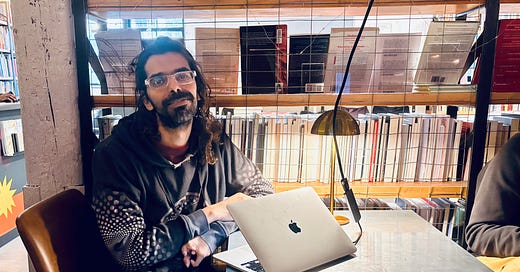



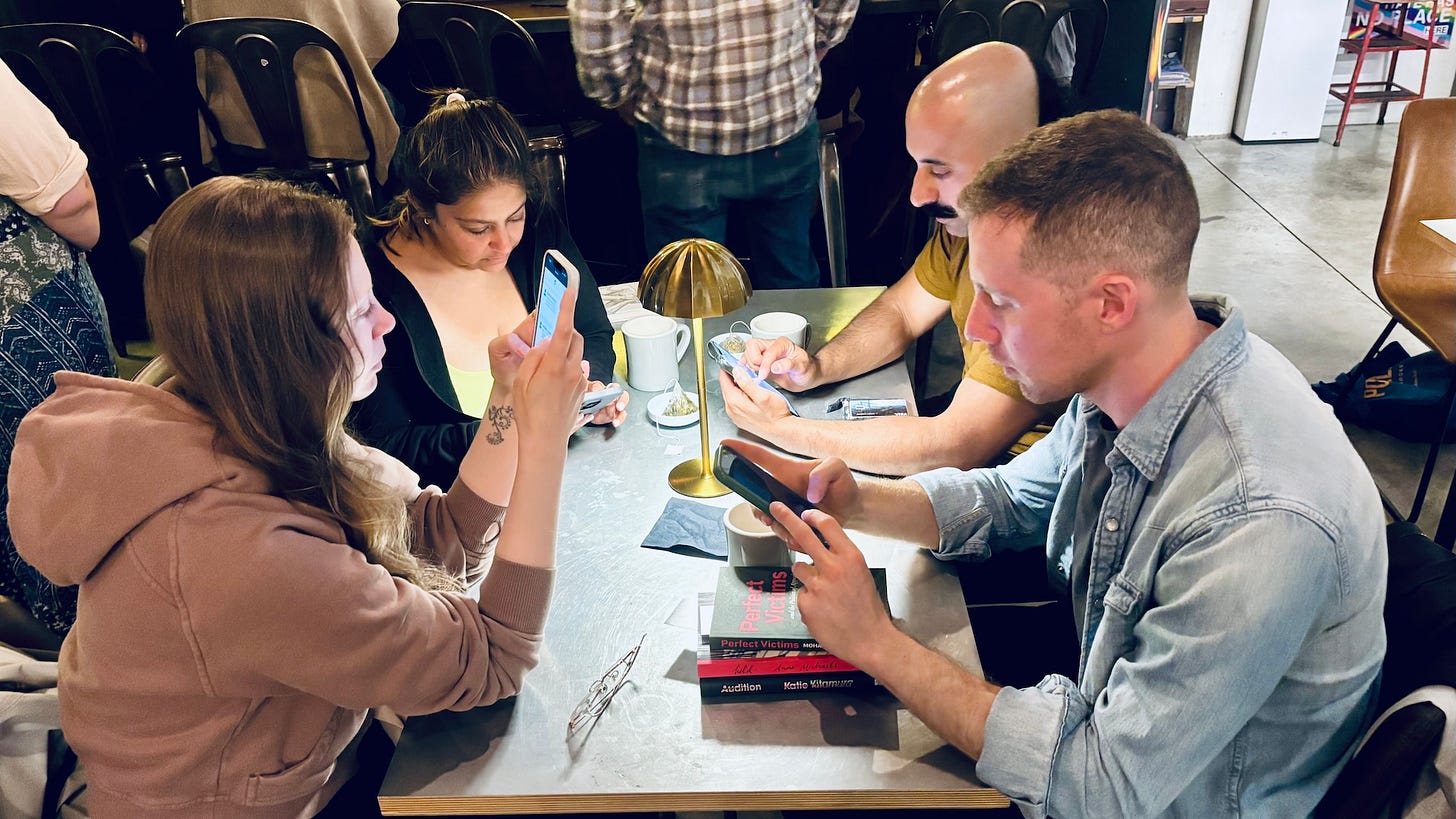
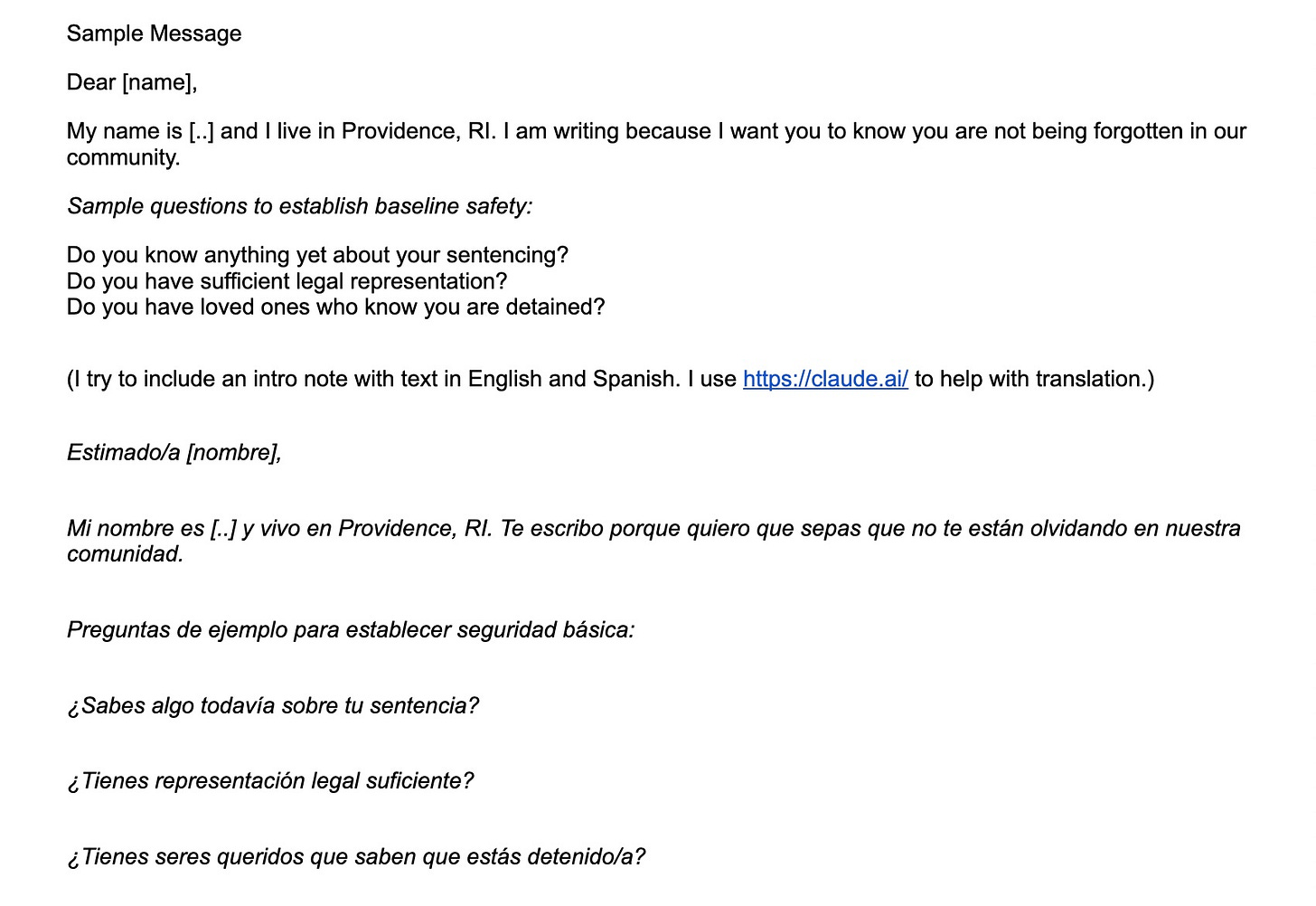
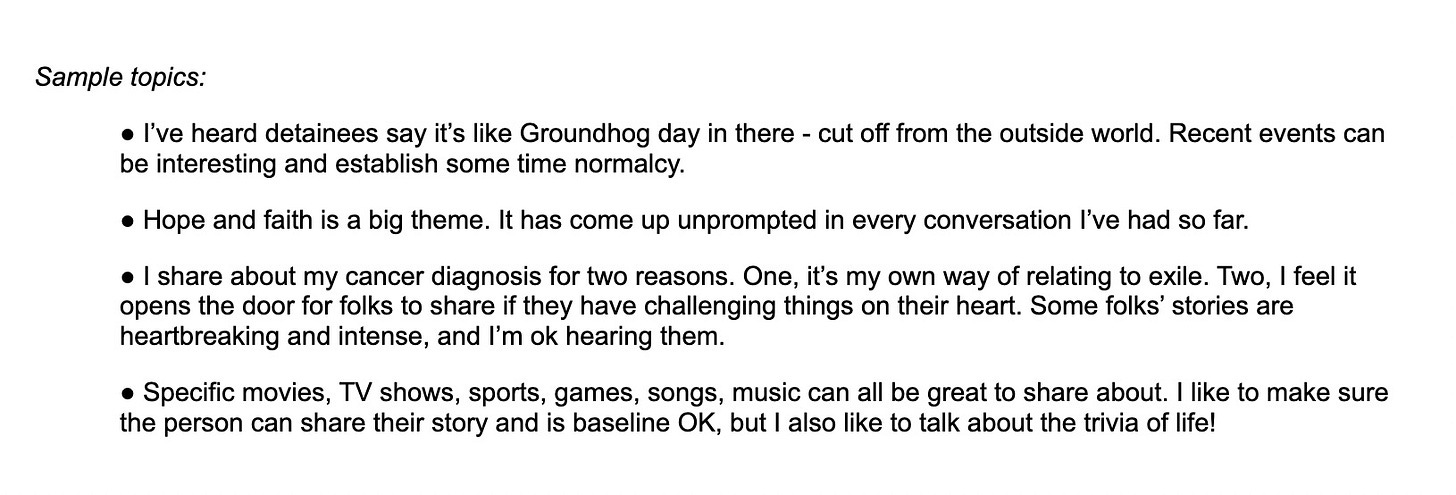
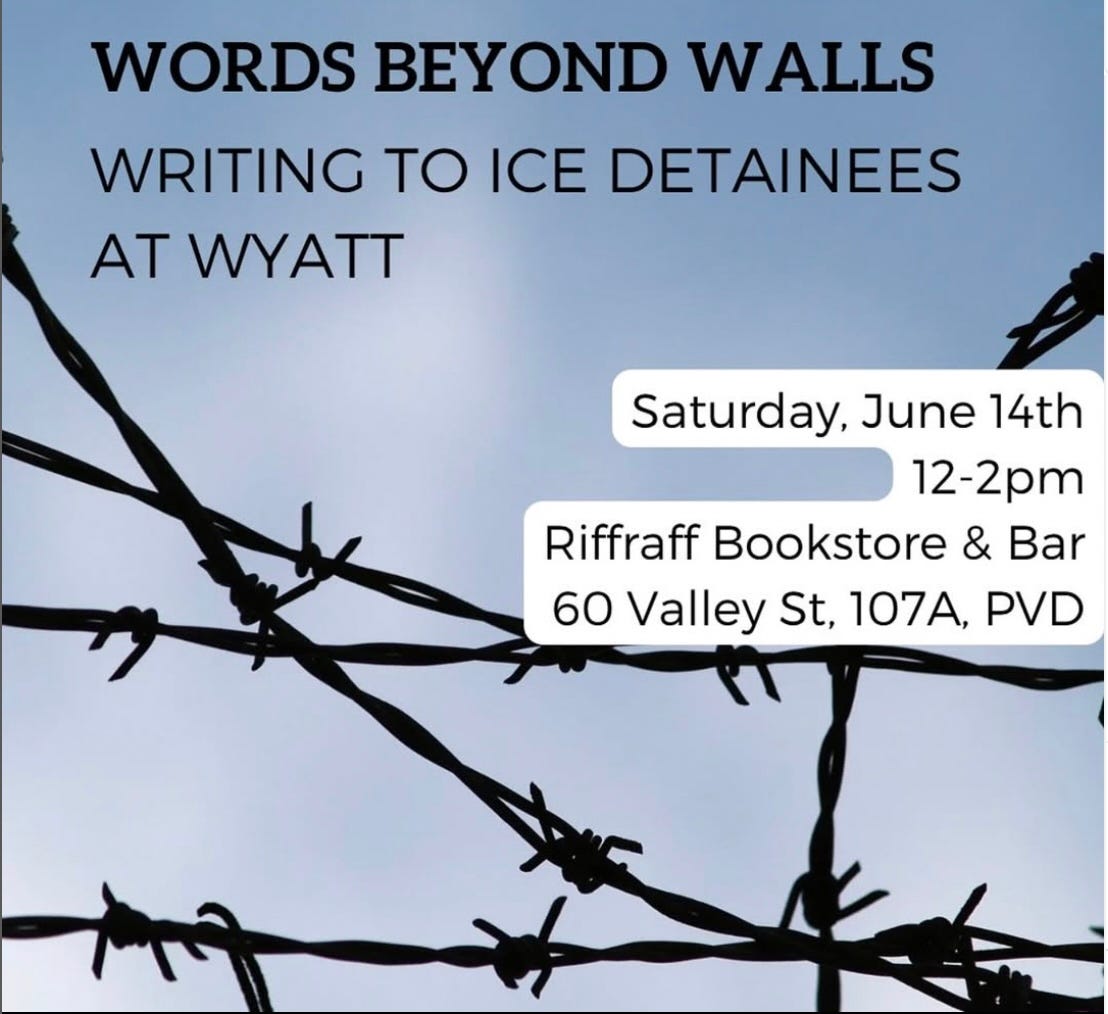

As someone who cannot always stand for hours, I love this story. Many of us are doing what we can do, and writing is one of those things.
So touched and inspired by this story! Thank you, Steve and Philip, for seeking out and sharing all the important stories, wherever they are. And thank you so much, Michael, for your brilliant compassion.